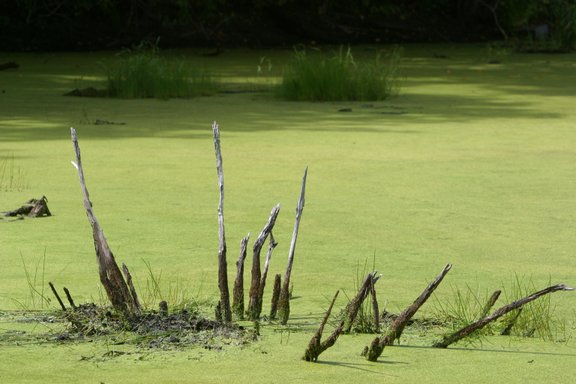
Utah State University researchers are using an innovative approach that takes oil from algae and converts it to biodiesel fuel. USU is currently conducting research on algae and plans to produce an algae-biodiesel that is cost-competitive by 2009.
Algae, plainly referred to as pond scum, can produce up to 10,000 gallons of oil per acre and can be grown virtually anywhere.
Professor Seefeldt, along with several fellow USU professors, formed the Biofuels Program to develop new and emerging technologies that will produce methane, biodiesel, hydrogen and alcohols from renewable, carbon-dioxide-neutral energy sources, such as consumer and agricultural waste and sunlight.
Great idea.
How about using Political Scum? We have no shortage of that, either.















ROTFLMAO, Eideard….
Oh wait, your last comment wasn’t meant in jest…?
So many sewage treatment plants, so much potential for algae that helps pay for the system. If the conversion process is actually commercially viable, cities would have a significant incenfitve to switch to algae processing of sewage and use it as a source of fuel for their fleet vehicles. Would have the added benifit of being less stinky, and make a major reduction in chemical costs for those using the more intense chemical processes.
Could also be a side product of mass meat production places; feed lots, chicken factories, hog farms. Turn those waste ponds into a major income source and cut down on smell in the bargin. Big Agribiz could go a little green and make a profit.
“How about using Political Scum? We have no shortage of that, either.”
That’s definitely a true statement. I don’t know about making biodiesel out of them though. But they are definitely filled with hot air!! Should be enough from Bush alone to fill a hole fleet of hot air balloons!
In the movie Knight Rider 2000, this technology reduced the price of oil to 10 cents a barrel.
Hasselhoff knows the future!
Something’s missing from the algae/biodiesel equation in the referenced article: what’s the production rate for the algae biodiesel:
10,000 gallons per acre per week, per month, or per year?
It makes a big difference, just like it makes on oil wells, which have different production rates.
Also, where do the algae fields have to be? An article here:
http://biodiesel.rain-barrel.net/algae-biodiesel-as-a-sustainable-solution/
suggests that the best sites are near industries that generate CO2, and in the Sonoran Desert, either in the US or Mexico. Water’s needed also.
#2 Algae does not treat wastewater. Algae gets carbon from the atmosphere, nutrients from the water source, and energy from sunlight. Wastewater is already being used to generate electricity, in the form of methane gas drawn off of anaerobic digesters sent to generators. Algae would be good as treatment for nutrient loading, but only as a downstream step from the bulk treatment of the wastewater, and only when there is a need to get rid of phosphorus or nitrogen. Wastewater is mostly a carbon source, however, requiring better microbes to get rid of the waste source. Also, algae has lower nutrient uptake rates than many other microbes. In summary, algae will not be a good way to treat wastewater, and wastewater will never be a great way to generate electricity or fuel.
No shortage of ‘science scum’ either…
Pond scum for fuel, political scum for food.
Soylent Green is PEOPLE!!!
As soon as we perfect the technology to produce energy from pond scum, Exxon and Shell will buy up all the ponds and have them paved over.
1 Acre = 43560 square feet
That’s about a quart of oil per square foot of surface of algae on the pond’s surface. It seems a little optimistic.
I’m not sure how pratical this technology will be. For starters, “pond farms” are likely to conflict with the Clean Water Act and wetlands protection. Any sectioning of existing wetlands for algae harvesting will need special permits from EPA and the Army Corp of Engineers — not likely. Building a privately-owned, 100,000-acre pond farm would be expensive: water rights would need to be secured and the ponds would need clay lining to prevent excessive loss of water. All-in-all, I think other bio-diesel options are more viable.
The Political Scum would just foul your plugs.
Nate, From some follow-up poking around, have to admit you are right, largely due to the issue of efficiency. Not quick, and not good in cold weather. There have been several research projects on this particular use of algae as a replacement to traditional water treatment methods, but whether they would scale and whether the algea is the right type to produce bio-fuels wasn’t evident to me.
Google “Michael Briggs Widescale Biodiesel production from algae”
Gives a summary of research that was funded by the department of energy from 1978 through 1996, Algae to bio-diesel is the main focus of the article. He does mention using waste water and feed lot run off as a potential source of feeding the critters, but there isn’t any specific mention of the process specifically for treating waste water.
He does give some figures from the earlier research on how many acres it would take to produce a reasonable qunatity of fuel.
#9 – “this might be a good idea for the entire Left Wing establishment”
Are you speaking of the U.S.A.? I guess I missed it. Where is it? I haven’t noticed a “Left Wing establishment” anywhere in the U.S. Oh, wait – I let you troll me, didn’t I. My bad.
#15, The left wing establishment is alive and well and firmly entrenched in the minds of the Fox Spews Channel.
Go easy on Jack. It is no fun having a battle of wits with an unarmed enemy.
Re Jack and #15–And there is no rebutting a content-free remark.